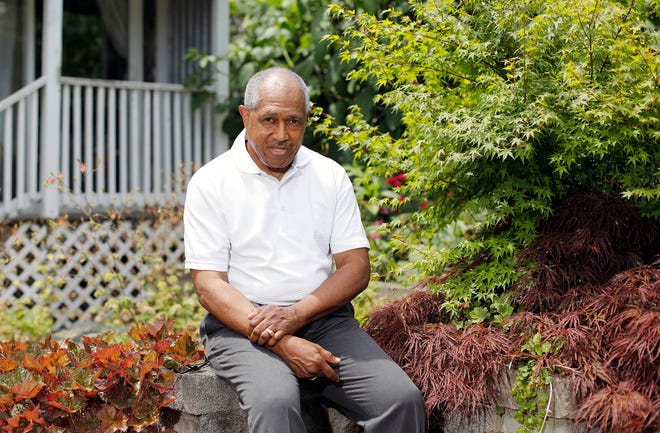
Dealing with the effects of aging can be hard on anyone, but for LGBTQ+ Ohioans like Keith Burkes it can be all the more challenging.
“I went in to see a doctor one time, and I told them my status and then all of a sudden they didn’t want to see me,” Burkes, 66, of Hilltop, said. “They farmed me out to somebody else.”
Burkes took the doctor to court in 1989, testified in front of the state of New York Supreme Court and won in 1993, he said. He now works with Project OpenHand in Central Ohio, which is dedicated to meeting the nutritional needs of men, women, and children in central Ohio living with HIV/AIDS, and their families, and shares his story across the state and U.S.
“I was happy for the fact that I got a paper victory,” said Burkes, a former Ohio State University student, who enjoyed a run of fame in the 1970s as the first African-American to perform the role of Brutus Buckeye. “It meant that doctors could not do that … but they just gave her a slap on the wrist … and it took years.”
Though Burkes was in his 30s when he was fighting the court case, he said it left him with a wariness of doctors and the strength to advocate for himself, which he has taken into his later life.
There will be an estimated 7 million LGBT Americans over age 50 by 2030, according to SAGE (Services and Advocacy for LGBT Elders), an advocacy group. About 4.7 million of them will need senior care and other services.
Pride Month:From agender to transitioning, a reader’s guide to LGBTQ terms and phrases
Many in the LGBTQ community are estranged from relatives and don’t have the option of relying on family to help them in their golden years. So, turning to others for care — in assisted living centers, nursing homes or hospice settings — makes them uniquely vulnerable, experts said.
As a result, many elderly members of the LGBTQ+ community rely on peers for support, which is due to the fact that so many like Burkes have faced prejudice, said Karen Fredriksen Goldsen, director of the health, sexuality and gender research center and center for aging at the University of Washington’s School of Social Work.
LGBTQ+ seniors are more likely to experience or have poor mental and physical health and are two times as likely to live alone, according to SAGE and the National Resource Center on LGBT Aging. The intolerance they face, said Fredriksen Goldsen, makes many aging LGBTQ+ seniors retreat into isolation instead of being open about their sexuality and gender identity, she said.
Senior living:After a year of isolation, vaccinations and state reopening provide hope for Columbus-area seniors
A long history of victimization and discrimination because of sexual orientation or gender identity also contribute to poor health, according to a 2018 issue brief by the Kaiser Family Foundation.
“Many experienced inequalities early in life … just with the laws that allowed discrimination,” Fredriksen Goldsen said.
Throughout the state, a variety of organizations are trying to help LGBTQ+ Ohioans navigate life as senior citizens with the goal of connecting them with other members of the community. Here are a few:
Stonewall Columbus: Trailblazers Program
Stonewall Columbus’s Trailblazers Program is a resource that is not just focused on promoting healthy practices among 50+ age groups, but also on socialization and helping to improve mental health by connecting Columbus residents.
“I think that since we are a community center, and since it’s a program that’s more focused on having a social outlet, we view socialization as having a more rich social network of folks (and that is) directly tied to mental well-being,” said Zac Boyer, manager for programs and outreach with Stonewall Columbus.
Boyer said that whenever Trailblazers discusses health care and healthy practices, they always bring in speakers and experts to help their members. Their calendar of events can be found at StonewallColumbus.org/trailblazers.
Ohio Womyns Intentional Living Communities
Started by Adlai and Carol Neubauer of Bexley, the Ohio Womyns Intentional Living Communities is a community of lesbian women and their female allies who support women age 50 and older in finding housing and fostering a strong sense of all-around well-being.
“These risks of loneliness and social isolation can affect anyone actually,” Adlai Neubauer said. “It doesn’t matter what your gender or sexual orientation is. It’s found to be even worse in the LGBTQ+ population because of stigma and discrimination and barriers to health care. So we’re hoping to provide a solution so that lesbians and their female allies have an option where they can live and support each other in a healthier way.”
The groups’ purpose is to foster communities and cooperative housing for gay women and allies. People can learn more and contact the group by searching Ohio Womyns Intentional Living Communities LLC on Facebook. The group is based in Columbus and began as a limited liability company roughly seven months ago, the Neabauers said.
A Place for Us Senior Living Apartments
Found between Lakewood, Ohio, and Cleveland — A Place for Us is an LGBTQ+-centered senior living apartment complex that first started renting its units in November 2016. It’s one of the first LGBTQ+-friendly senior living communities in Ohio and is open to renters ages 55 and up.
The building, on Madison Avenue near West 117th Street, isn’t limited to LGBT residents but is primarily in place to assist those within the community.
To contact the living community, call 216-242-1965 or go online at www.apfuhousing.com.

JDandron@Dispatch.com
@JosephDandronMI








